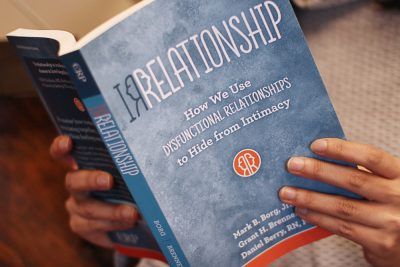Relationships
Business Connections Complicated by Irrelationship
The threat of closeness can complicate decision-making.
Posted August 30, 2016

Carlson and Mike glared at one another across the table. Finally Carlson broke the brittle silence: “After our last meeting, I thought you were gonna show up today with concrete proposals.”
Mike replied, “Well, I didn’t expect to be put on the hot-seat quite this soon after I signed the NDA.”
Carlson thought it had been clear from the last meeting, several months prior, that Mike agreed he would prepare a proposal for the project after reviewing the confidential materials that were shared with him. After all, no resistance was offered when Mike quoted how much he expected to be paid for his services at the time he accepted confidential materials. So when he showed up empty handed, Carlson’s BS detector started ringing off the wall.
Even worse, perhaps, instead of offering anything constructive, Mike began quibbling over the terms of their prospective business agreement, offering as a credential an anecdotal story about work he’d done for a well-known fiction writer a couple of years before. Strangely (Carlson thought) he then revealed that he’d written up his anecdote only the night before, revealing, perhaps, questionable judgment as well as a bizarre perspective on his own work.
Carlson’s business partner Ted became increasingly uneasy as he watched these events unfold. Ted and Mike had worked together on a past project and had since become friends. Ted enthusiastically introduced Mike to Carlson as a possible associate in the project, but now found himself in an uncomfortable position between two people whose work he respected. Ted’s connection to Carlson was grounded in shared business and legal commitments, while his connection to Mike was more personal, with considerable professional regard. He also liked working with Mike because of his low-key manner.
Carlson and Ted had chatted for a few minutes before Mike arrived. Money was tight, but both were pleased with how project was progressing. When Mike arrived, all he brought with him was the news that, without authorization, he had purchased a web domain using their project’s name. (When Carlson and Ted’s Intellectual property lawyer found out about this, she hit the ceiling.) Ted then admitted to himself that he was just as taken aback as Carlson.
Carlson, however, didn’t mince words, questioning whether working with Mike would add value to the project. Mike, on the defensive, retaliated by disparaging the project altogether—a significant shift from initial feedback he’d given about the project. Ted was embarrassed by Mike’s attitude, but couldn’t bring himself to join in Carlson’s attack.
After a few seconds, Mike, his attitude less defensive, disclosed that in the past, he had allowed himself to get burned in business dealings by offering too much without ensuring appropriate compensation. “But,” he said, “I really bristled at the suggestion that when I bought up that URL, I was looking for a way to con you. That’s not who I am. Ted at least, knows that about me—I hope.”
Carlson tamped down somewhat, responding that “when you discovered these domains were available, I’d have expected you to e-mail or call and ask if we wanted you to grab them.”
Finally, Ted spoke up. “Being in the middle of this is painful and embarrassing. I care about both of you, but I wouldn’t have introduced you if I didn’t think it had great business potential.” Ted then recounted an experience with a project a few years earlier with two former colleagues whom he’d invited into a project he was working on at that time. Both of these individuals were having difficulties in their personal lives at the time, and, Ted admitted, his desire to be “helpful” was partly why he had invited them to work with him. Then, after working together for nearly a year, both unexpectedly walked away from the project with little notice or explanation. Now Ted was starting to feel similarly betrayed by Mike, and wondered if he had unconsciously set-up another scenario like the one with his two former colleagues, possibly with a similar outcome.
Irrelationship is a way of relating to others that diminishes awareness of anxiety by using caretaking behaviors as a stand-in for developing true understanding, intimacy and investment in others. Carlson and Ted had done some hard work to defuse the irrelationship dynamic that periodically interfered with their working relationship. They’d learned how to treat personal and work-related tensions constructively so that the project usually proceeded undisturbed. That enabled Ted to see that his introducing Mike to the project had some of the markers of irrelationship-style caretaking.
When the acute crisis died down, Mike was able to suggest that he might be able to sketch out a proposal that met Carlson and Ted’s needs without opening himself to repeating past negative experiences. The conversation then took a more amicable tone, although an undercurrent of tension remained. The meeting ended without a concrete commitment to any further meetings.
To order our book in paper, e-book and now audiobook, click here. Or for a free book excerpt, join our mailing list
Join our mailing list: http://tinyurl.com/IrrelationshipSignUp.
Visit our website: irrelationship.com
Follow us on twitter: @irrelation
Like us on Facebook: fb.com/theirrelationshipgroup.
Read our PT blog: psychologytoday.com/blog/irrelationship.
Add us to your RSS feed: psychologytoday.com/blog/irrelationship/feed





